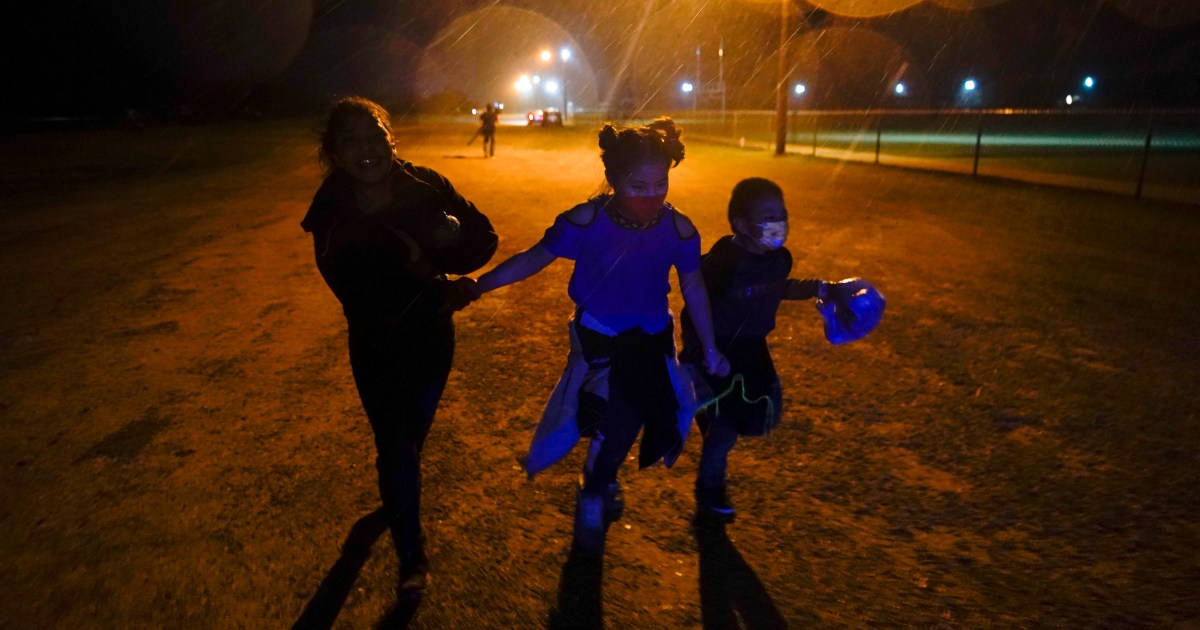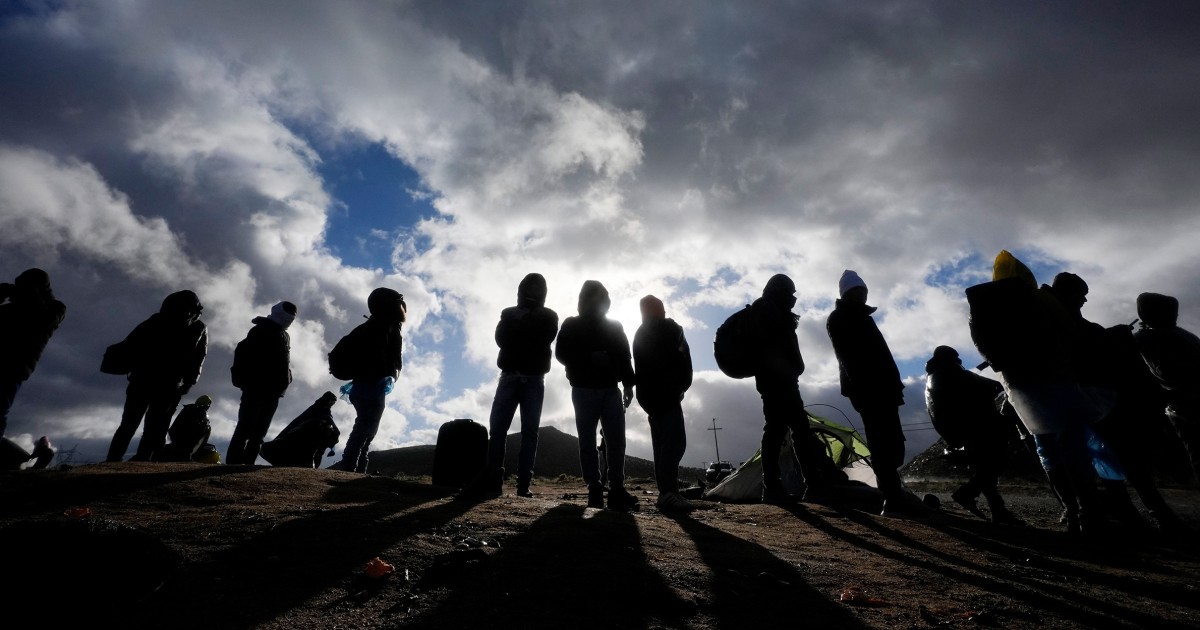The police guard a group of immigrants at the Gran Canaria airport in April 2021.Javier Bauluz
The XII High Level Meeting (RAN) between Spain and Morocco, to be held this Wednesday and Thursday in Rabat, will bring together a dozen ministers, but on the agenda between the two countries there is always a priority issue: irregular immigration.
The reconciliation between the two countries last March reduced the arrivals of irregular immigrants by more than 25% in 2022, but the margin to increase collaboration is enormous and Spain and Morocco have several pending issues.
Despite the decline, it remains to be seen if the trend is consolidated and if control will go beyond sub-Saharan Africans, since Moroccans continue to be the most numerous among those who cross Spanish borders irregularly.
Another urgent issue for Spain —and for the European Union— is to increase the figures for returning and expelling irregular immigrants,
which remain at the lowest levels in the historical series.
Sources from the Ministry of the Interior affirm that work is being done "to continue increasing return capacities", not only with Morocco, but with the nearly 30 countries with which return agreements are in place.
Spain's turn to align itself with Rabat and classify its offer of autonomy for Western Sahara as the "most serious, realistic and credible" option had immediate diplomatic consequences, as well as economic ones, and also had an impact on the deployment that Morocco dedicates to control the departure of emigrants from their territory.
The figures for irregular entries (31,219) dropped to 2017 levels, the Canary Islands finally had some respite after two years of continuous landings, but this is, for now, only a turning point.
Morocco and Western Sahara, controlled by Rabat, continue to be the main points of departure for emigrants and Moroccans are the main occupants of the boats that arrive on Spanish shores.
Among the immigrants and refugees who arrived in 2022, 42% were Moroccans,
followed by Algerians (21%) and Senegalese (10%).
The percentage is somewhat higher than in 2021, when Moroccans accounted for 31% of newcomers.
The Ministry of the Interior never publishes these figures so as not to inconvenience the countries of origin, but they appear in a confidential report from the European Commission to which EL PAÍS has had access.
The economic crisis, the impact of the pandemic on sectors such as tourism and the drought are some of the reasons that lead Moroccans to emigrate, but also the suffocation of the regime.
In this sense, a report by The Global Initiative, a reference platform that studies organized crime throughout the world, points out that there is an increase in Moroccans trying to cross into Spain by boat from the north of the country, an area from which 2019 more controlled.
The information, contained in the Commission's report, ensures that these Moroccan citizens come from the Rif region, a territory with high rates of poverty that remains in rebellion against a regime that represses popular protests in this region with long prison sentences. region.
According to The Global Initiative,
Returns are faltering
The return of immigrants in an irregular situation is a fundamental pillar in the migration policy of the European Union, but rather than being reinforced, it is faltering.
The European Commissioner for the Interior, Ylva Johansson, expressed her concern last Tuesday about this matter, which she considers urgent. The pandemic hindered all efforts to increase expulsions, but once the movement restrictions for health reasons have ended, return rates remain low , among other things because the countries of origin do not collaborate as the EU would like.
“We can make significant progress to increase the number of returns and make it more effective and faster,” she said.
According to the Eurostat statistical office, in 2021 only 21% of the more than 342,000 return orders issued throughout the EU were executed.
Of the almost 22.
Spain has several open fronts to increase the returns of irregular immigrants.
Sources from the Ministry of the Interior maintain that Spain is one of the countries "with the greatest capacity to return", although the data does not support this statement.
In 2021, 42,597 return and expulsion files were opened (two different repatriation procedures), but only 3,594 were executed, that is, barely 8.4% of the total, according to data collected by the Ombudsman.
This is an especially low number, considering that before the pandemic, between 9,000 and 11,000 immigrants were expelled and returned each year.
The Eurostat statistics also show a long list of countries that return more than Spain, including France, Italy, Greece, Germany or Belgium.
While Spain maintains recurring return flights to Latin America or Albania, returns to Algeria have been suspended since the Pedro Sánchez government decided to side with Rabat in the Saharawi dispute.
The returns of Moroccans, for their part, were reactivated with three weekly flights in 2020 with the arrival of thousands of people to the Canary Islands, but they were suspended shortly after for health reasons.
Although symbolic, the number of returns that were carried out from the islands was anecdotal compared to the number of Moroccans that landed on the islands.
The requirements imposed by Rabat, which only accepted documented and vaccinated nationals, complicated the mission.
However, the return of Moroccans and nationals of other countries to Morocco was one of the issues discussed jointly in May at the XX Meeting of the Spanish-Moroccan Permanent Group on Migration.
Two sources that participated in that delegation told EL PAÍS that the Moroccan authorities showed a great willingness to accept immigrants back, Moroccans and sub-Saharans, in hot air and by plane.
This receptiveness of Rabat was seen, for example, on June 24 during what is known as the Melilla tragedy, when in addition to the death of at least 23 people, the Moroccan guards accepted the return of 470 people in one fell swoop.
Beyond this, the nationality of the immigrants returned to their countries, is another of the data that the Interior does not make public and it is not possible to know, for the moment,
Subscribe to continue reading
Read without limits
Keep reading
I'm already a subscriber

/cloudfront-eu-central-1.images.arcpublishing.com/prisa/KFYFHDJA2RDT5KSKCJVMOXB2SA.jpg)



/cloudfront-eu-central-1.images.arcpublishing.com/prisa/GZBJJXO3EZE2HLSP5ZRRKYYYOY.JPG)
/cloudfront-eu-central-1.images.arcpublishing.com/prisa/QF7KR4D3ARA6ZPOCSTZEFF4EME.jpg)


